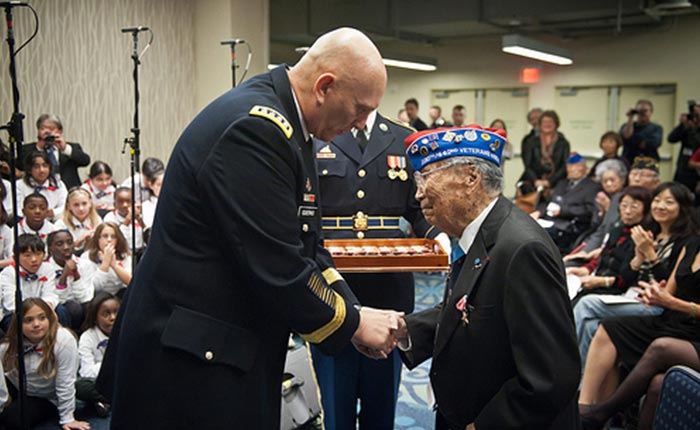While there aren’t many fortune 500 companies founded by veterans, entrepreneurship is on the rise among veterans. According to the U.S. Small Business Administration as many as one in four veterans are interested in starting or buying their own business.
Although veteran’s posses many of the skills required to run a business, which makes them more than twice as likely to own a business as the general population, they also face many roadblocks that prevent them from becoming business owners.
Overcoming Challenges
Veterans face many challenges when it comes to starting their own business. The problems start when they return home and look towards transitional support programs to help them adjust to civilian life. The current programs offer training that focuses primarily on composing resumes, writing cover letters, and rehearsing for job interviews. While these training methods can help veterans find jobs, they spend little time covering topics important for becoming an entrepreneur like venture capital, bootstrapping, and finding a cofounder.
Luckily, dedicated veterans have been able to overcome this lack of education and become entrepreneurs thanks to men like Brandon Shelton, a former Army infantry and military intelligence officer, the founder of Task Force X Capital Management. Task Force X is one of many new venture capital firms that are working specifically with entrepreneur veterans.
Money from these venture capital firms can help veterans grow their businesses into fortune 500 companies like FedEx, which was founded by former marine Frederick Smith.
10 Noteworthy Startups Lead by Veteran a Entrepreneur
 1) Spark Finance
1) Spark Finance
Mike Slagh, a former U.S. Navy Explosive Ordnance Disposal officer, cofounded Spark, a mobile app that seeks to help people learn to invest. The app provides users with daily market advice and stock trading tips. It also includes more in depth tools such as technical charting, fundamental data, and stock picks from popular traders. Spark recently recieved an investment from the venture capital company Social Leverage.
2) inKind
Founded by former U.S. Army Field Artillery Officer Nick Black, inKind is a platform where nonprofits can raise money to fill specific needs. By allowing people to fill nonprofit’s specific needs Black believes inKind can foster a more meaningful and personal connection between donors and nonprofits. They work primarily with Habitat for Humanity and other brick and mortar projects where donation of specific items is easier, but have recently been working on serving more vertical markets thanks to capital from Task Force X.
3) GuideOn
Founded by Anthony Garcia, a former U.S. Army  helicopter aviator, GuideOn is a platform that helps veteran’s translate their military knowledge into language that can be recognized by corporate recruiters. The company’s first product allows users to input their military service details and have it instantly “translated” into a professional civilian resume. GuideOn recently received an unknown amount of funding from Floodgate to help fund the development of its products.
helicopter aviator, GuideOn is a platform that helps veteran’s translate their military knowledge into language that can be recognized by corporate recruiters. The company’s first product allows users to input their military service details and have it instantly “translated” into a professional civilian resume. GuideOn recently received an unknown amount of funding from Floodgate to help fund the development of its products.
4) SandBoxx
Founded by General Ray Smith and Sergeant Sam Meek of the U.S.  Marine Corps, Sandboxx is an app that lets families and friends send physical mail and photos to service members directly from their mobile device. The app also helps veterans to stay connected with one another when they return home from active duty. Sandboxx recently received a $700,000 venture capital investment and is seeking an additional $1,300,000 to continue developing the product.
Marine Corps, Sandboxx is an app that lets families and friends send physical mail and photos to service members directly from their mobile device. The app also helps veterans to stay connected with one another when they return home from active duty. Sandboxx recently received a $700,000 venture capital investment and is seeking an additional $1,300,000 to continue developing the product.
5) ProctorFree
 Cofounded in 2012 by Mike Murphy, a former officer in the U.S. Army, ProctorFree provides a new way for teachers to administer and supervise online exams. The company now has more than 25 employees and is working to partner with new educational partners. They hope to grow their business to create a better and more uniform system for the increasing number of students obtaining degrees online. ProctorFree recently received a venture capital investment through Task Force X that will help to bring the product to more students across the country.
Cofounded in 2012 by Mike Murphy, a former officer in the U.S. Army, ProctorFree provides a new way for teachers to administer and supervise online exams. The company now has more than 25 employees and is working to partner with new educational partners. They hope to grow their business to create a better and more uniform system for the increasing number of students obtaining degrees online. ProctorFree recently received a venture capital investment through Task Force X that will help to bring the product to more students across the country.
6) Rumi Spice
Founded by Kimberly Jung, a former Officer and Platoon  leader for the U.S. Army, Rumi Spice is a social enterprise that imports saffron from farmers and cooperative in Afghanistan. Jung hopes to create economic opportunity for the farmers in Afghanistan by connecting them to international markets. She hopes that this will give people the opportunity to build a positive future. Rumi Spice is currently seeking a $1,000,000 venture capital investment.
leader for the U.S. Army, Rumi Spice is a social enterprise that imports saffron from farmers and cooperative in Afghanistan. Jung hopes to create economic opportunity for the farmers in Afghanistan by connecting them to international markets. She hopes that this will give people the opportunity to build a positive future. Rumi Spice is currently seeking a $1,000,000 venture capital investment.
7) Plated
Cofounded by Nick Taranto, a former infantry officer in the US  Marine Corps, Plated is a New York City startup that delivers chef-designed recipes with pre-portioned ingredients on a weekly basis. Plated has become one of the major players in the ready to cook food delivery industry by providing ultra high quality ingredients for specific meals. Plated has raised more that $56,000,000 in venture capital funds.
Marine Corps, Plated is a New York City startup that delivers chef-designed recipes with pre-portioned ingredients on a weekly basis. Plated has become one of the major players in the ready to cook food delivery industry by providing ultra high quality ingredients for specific meals. Plated has raised more that $56,000,000 in venture capital funds.
8) Uvize
Cofounded by Dave Cass, a former soldier in the U.S. Navy, David Parker, a former soldier in the U.S. Air Force, and Bo Bergstrom, a former U.S. Marine, Uvize is a platform that helps match students with mentors. Uvize provides services specifically to help veterans prepare for college and learn new relevant skills. They believe that their program will help lower the dropout rates among veterans in higher education by providing them with mentors that understand their struggles. Uvize has raised more that $1,000,000 from venture capital investors.
9) Sword & Plough
Founded by U.S. Army 1st Lt. Emily Nunez Cavness, Sword &  Plough is an accessory company that uses repurposed military surplus fabric into stylish bags. Sword & Plough also helps to support other veterans by working with veteran owned and operated manufacturers. Cavness received a $50,000 venture capital investment from MassChallenge to help grow the business.
Plough is an accessory company that uses repurposed military surplus fabric into stylish bags. Sword & Plough also helps to support other veterans by working with veteran owned and operated manufacturers. Cavness received a $50,000 venture capital investment from MassChallenge to help grow the business.
10) Rhumbix
Founded by Zach Scheel and  Drew DeWalt, both former U.S. Navy officers, Rhumbix is a mobile platform that is designed to provide insights on construction sites. Using their previous experience working on construction sites Scheel and DeWalt created an application that uses real-time data to help site managers with timekeeping and cost management. The app clocks time worked and the locations of workers across a construction site. Rhumbix is designed to scale and can work on construction sites ranging from a few dozen workers to those with thousands. Rhumbix recently raised $6,130,000 with the help of venture capital firm Greylock Partners.
Drew DeWalt, both former U.S. Navy officers, Rhumbix is a mobile platform that is designed to provide insights on construction sites. Using their previous experience working on construction sites Scheel and DeWalt created an application that uses real-time data to help site managers with timekeeping and cost management. The app clocks time worked and the locations of workers across a construction site. Rhumbix is designed to scale and can work on construction sites ranging from a few dozen workers to those with thousands. Rhumbix recently raised $6,130,000 with the help of venture capital firm Greylock Partners.





